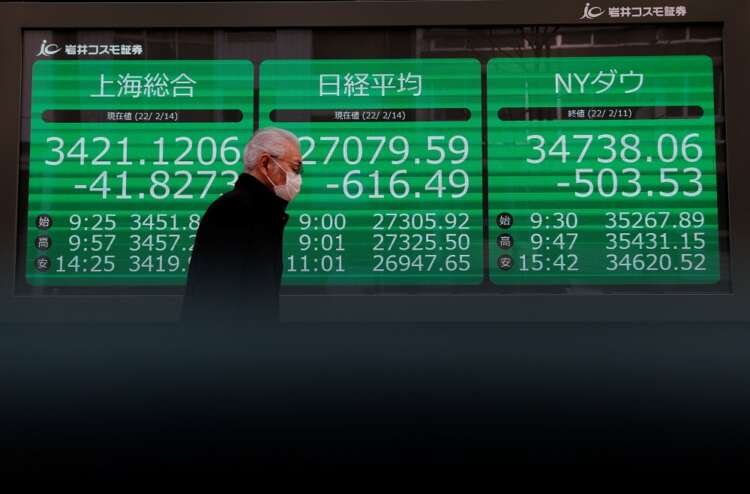Stocks and bond yields fall on Taiwan tensions


By Tom Wilson and Kevin Buckland
LONDON/TOKYO (Reuters) – Global stocks slipped and bond yields fell on Tuesday, compounding fears of a global recession, on concern that a visit by U.S. House of Representatives Speaker Nancy Pelosi to Taiwan would further harm relations between China and the United States.
Investors sought safer assets after China threatened repercussions if Pelosi visited the self-ruled island, which Beijing claims as its territory.
U.S. long-term Treasury yields dropped to a four-month low, while euro zone bond yields fell. The dollar and Japanese yen gained. Crude oil also sank as investors amid signs of a global manufacturing downturn.
Pelosi was expected to arrive in Taipei later on Tuesday, with several Chinese warplanes flying close to the median line dividing the Taiwan Strait, a source told Reuters.
China has repeatedly warned against Pelosi going to Taiwan. Washington said on Monday it would not be intimidated by China.
MSCI world equity index, which tracks shares in 47 countries, fell 0.4%. The broad Euro STOXX 600 shed 0.7% before clawing back some of its losses.
Wall Street stocks were set to fall around 0.7%, futures gauges showed.
“It’s all about the Taiwan threat,” said Robert Alster, chief investment officer at Close Brothers Asset Management. “There’s no way you can say its not moved up to geopolitical agenda.”
The Taiwan issue added to a sense of unease sparked by China, Europe and the United States on Monday reporting weakening factory activity, with that in the U.S. decelerating to its lowest level since August 2020.
The benchmark 10-year U.S. Treasury yield fell as low as 2.53% in Tokyo trade, the lowest since April 5, also benefitting from bets a slowdown could spur the U.S. Federal Reserve to ease off the policy-tightening pedal.
Germany’s 10-year government bond yield fell 4.5 basis points to 0.72%, after hitting its lowest since early April.
Brent futures edged down to $99.55 a barrel after losing almost $4 overnight. U.S. West Texas Intermediate futures also eased to $93.59, extending Monday’s almost $5 slide.
MSCI’s broadest index of Asia-Pacific shares retreated 1.3%. Taiwan’s stock index dropped as much as 1.9%, while Chinese blue chips tumbled 2.5% before making u some of their losses.
AUSSIE WEAKENS
The flight for safety played out in currency markets, too.
The U.S. dollar slid to as low as 130.40 against the Japanese yen, levels not seen for almost two months. Against a basket of currencies, the dollar rose 0.25% to 105.61.
The Taiwan dollar slipped to its lowest level in more than two years on the weaker side of 30 per U.S. dollar.
Australian stocks pared declines and the Aussie dollar weakened after the central bank raised the key rate by an as-expected 50 basis points, with markets interpreting changes to the accompanying policy statement as dovish.
The Aussie was 0.51% lower at $0.69910, extending a 0.14% retreat following the Reserve Bank of Australia’s policy decision.
It had hit the highest since June 17, at $0.7048, in the previous session but that was after bouncing off a 26-month trough at $0.66825 in the middle of last month.
“The Aussie has been underperforming other major currencies lately given global growth concerns so it really needed a hawkish surprise to reignite its recovery from 2-year lows,” said Sean Callow, a currency strategist at Westpac in Sydney.
“Instead, it got the RBA leaving the door wide open to slowing the pace of tightening at future meetings.”
Cryptocurrencies, a barometer for risk appetite, also fell, with bitcoin slipping 2.3% to $22,753.
(Reporting by Tom Wilson in London and Kevin Buckland in Tokyo; Additional reporting by Tom Westbrook; Editing by Robert Birsel and Angus MacSwan)
A global recession is a period of economic decline that affects multiple countries, characterized by falling GDP, rising unemployment, and reduced consumer spending.
Safe-haven assets are investments that are expected to retain or increase in value during times of market turbulence, such as gold, U.S. Treasury bonds, and certain currencies.
Currency hedging is a strategy used by investors and businesses to protect against potential losses due to fluctuations in exchange rates.
The MSCI World Equity Index is a stock market index that tracks large and mid-cap equity performance across 23 developed countries.
Bond yields represent the return an investor can expect to earn if they hold a bond until maturity, typically expressed as an annual percentage.
Explore more articles in the Investing category











